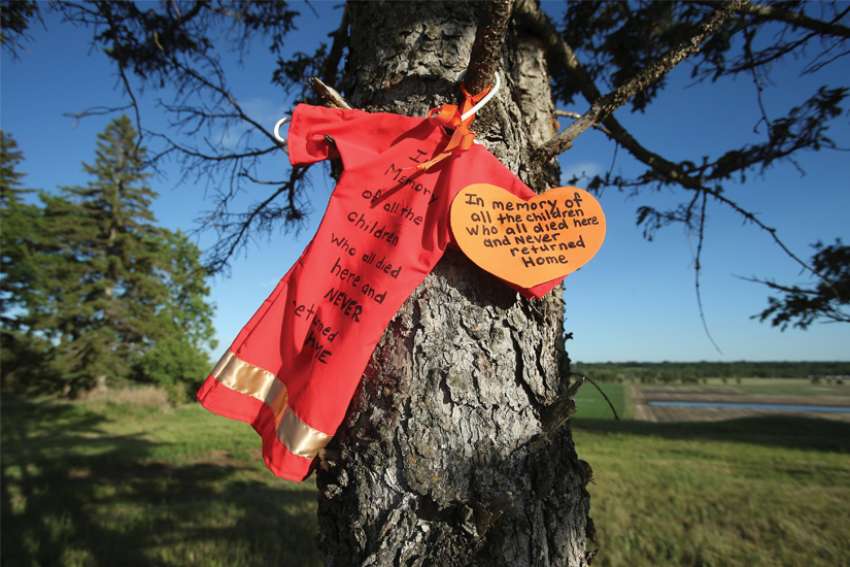This year we have heard about tragic events and disasters as we are experiencing the effects of the COVID-19 pandemic with its death toll. The recent reports surrounding the discovery of Indigenous children in unmarked graves at the sites of former residential schools operated by the Catholic Church have added more tragedy. We as a community, are sad, shocked and many are wrestling with their faith as we all strive to seek the truth regarding this dark chapter in our history.
We have reacted to this tragedy about Indigenous children because our faith in God is one that is life giving. In response to the tragedy, the Archbishop of the Archdiocese of Toronto, Cardinal Thomas Collins, issued a strong statement to the faithful. He began his statement by emphasizing a very important teaching of our faith that we are one body — “If one member suffers, all suffer together with it” (1 Cor. 12:26). As a sign of our solidarity, respect and support to our brothers and sisters who have been affected by this tragedy, many parishes have erected or prayed before shrines in honour of the children and offered prayers for the children and for those who have suffered and are still suffering from this tragedy.
In order to respond clearly to questions about the Church and to the tragedy, statements from the Canadian Conference of Catholic Bishops (CCCB) have informed us about the discussions that are going on with the Church in Canada and the leaders of the Indigenous peoples towards a path to truth, peace and reconciliation. The statements have informed us that the Church has been working with the leaders of the Indigenous peoples over the past years towards peace.
In fact, a meeting of the Church and the leaders of the Indigenous peoples with Pope Francis at the Vatican had been planned for the fall of 2020. But because of the pandemic, the meeting could not be held. The recent statement from the CCCB (June 29) tells us that this meeting is going to take place from Dec. 17-20 to “foster meaningful encounters of dialogue and healing.”
This is an encouraging step, a step with the hope that the encounter will lead to a “shared future of peace and harmony between Indigenous peoples and the Catholic Church in Canada.”
As we are grappling with the sad news surrounding the discovery of children in unmarked graves, as Christians, what should we do? In Cardinal Collins’ statement, he invited us to “join with the Indigenous peoples, the Catholic community and Canadians from coast to coast in a period for collective grief for those who are physically, emotionally and spiritually wounded.” As people of prayer, this calls us to pray without ceasing (1 Thess. 5:17). Our collective prayer at Mass and our individual prayers may help us to connect with God and teach us to trust God, and help us share the grief and sorrow of our brothers and sisters. This is the time for us to pray for the leaders of all the parties that the Spirit may spiritually prepare them for the meeting in the Vatican. As people of Canada we can also pray that God “grant wisdom to those who govern it and respect for human life and the dignity of every citizen, so that justice may flourish and all peoples live in unity and peace” (Opening Prayer at Mass on Canada Day).
As people of faith we are on our faith journey. At this moment of the journey, we can pause and reflect on the state of affairs in the Church. What do these tragic events mean to us? Such a self-reflection can challenge our faith, yet it may help us to accept the reality of the current situation. It may challenge us to examine our actions in our own lives and in the life of our communities of faith by reminding us of the importance of the dignity of every person created by God.
In his apostolic exhortation Evangelii Gaudium (The Joy of the Gospel), Pope Francis tells us that “the mere fact that people are born in places with fewer resources or less development does not justify the fact that they are living with less dignity” (190).
How do we live out this statement in our parish communities and elsewhere? Our reflection on this tragedy may teach us to be aware of our actions and of our responsibilities as Christians. Values from our faith traditions — compassion, listening to and caring for each other — help us live together as children of God.
As Christians, acknowledging our past failures can be painful. We may be experiencing something similar to the story from the Gospel of Mark (4:35-41) that we read a few weeks ago at Mass. The disciples and Jesus encountered a threatening storm as they journeyed across the Sea of Galilee. The storm was chaotic, yet Jesus controlled it and brought peace to His disciples.
In the midst of the reported tragic events at the sites of former residential schools, the biblical story of the storm offers us hope. In the midst of the storm, as people of faith, we are called to bring calmness by seeking peace.
Jesus encourages us to walk on the path of reconciliation and stewardship with our Indigenous brothers and sisters. Through the intercession of St. Kateri Tekakwitha, may God “fill us with a strong and selfless love that we may ever seek reconciliation and justice among all cultures, races and nations” (Prayer after Communion at Mass on Canada Day).
Let us ask God to journey with all of us in this country as children of God to a new hope and a new beginning.
(Fr. Acheampong is pastor at Our Lady of Peace Parish in Toronto.)


